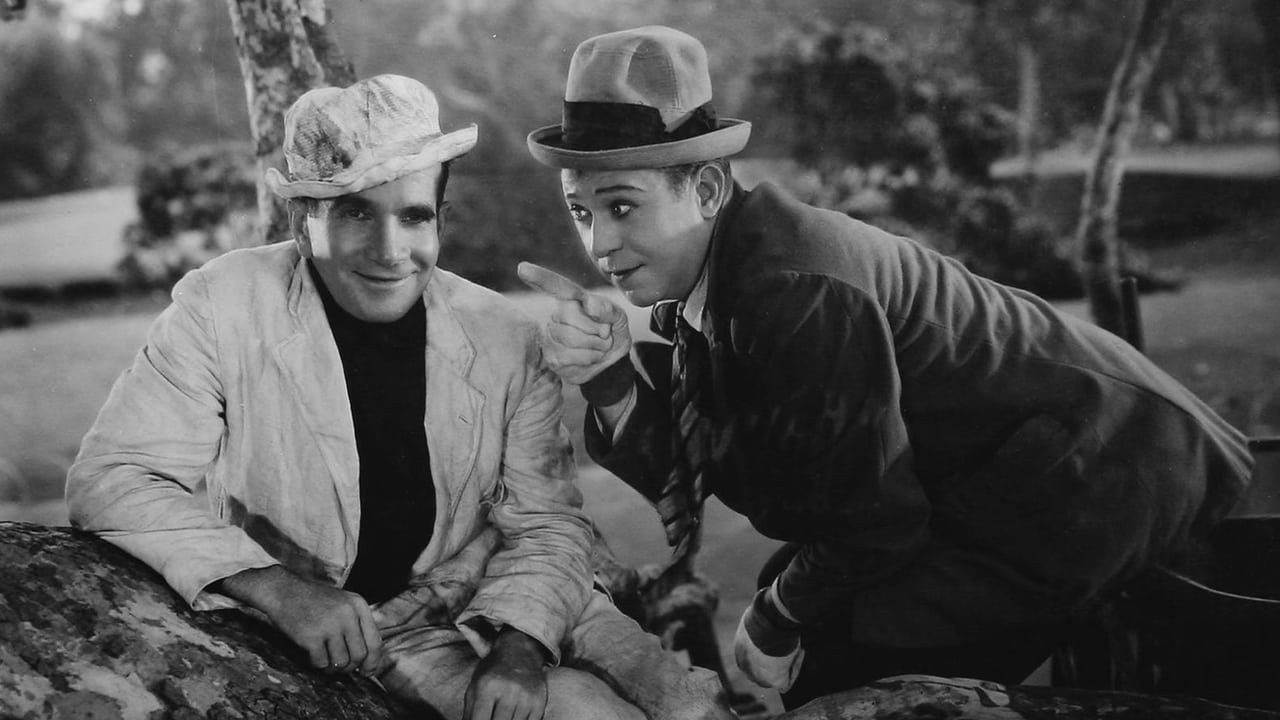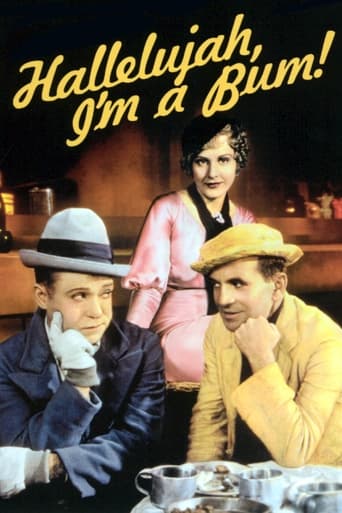

The story of the 1930s musical is very much the story of its stars. As the genre developed different stars came and went. And sometimes, established stars adapted alongside the musical itself. Al Jolson featured in some of the most successful movies of the early talkie era, in what were not really true musicals but stories about the music hall, essentially showcasing the persona Jolson had been playing for years on the stage. However by 1933 such theatrical musicals no longer cut it with audiences, and Hallelujah, I'm a Bum sees Jolson ditching his blackface and immaculate dinner suit for the battered attire of a down-and-outer in this topical depression-era musical in which the songs weave into the narrative.Hallelujah, I'm a Bum was not like those flimsily-plotted stage musicals, where the story really only existed to string the numbers together. Its screenplay is by no less a personage than S.N. Behrman, from a story by Ben Hecht. These two practically defined screen writing in classic-era Hollywood, and their list of credits is astounding. For this particular opus, they make light of the poverty-stricken times with a tale of homeless folk being cheerful about their situation. Rather disrespectful perhaps, but it's belittling poverty as much as it's ignoring the real unpleasantness of it. And all this jocularity builds into a very tender and poignant love story, giving a bittersweet twist without having to wallow in the depressing business going on in the streets at that time.The music and lyrics are by that celebrated duo Rodgers and Hart. Richard Rodgers is now of course better-known as having been one half of Rodgers and Hammerstein. His melodies are still just as beautiful, if a little less grand than they would be with Oscar Hammerstein, but Lorenz Hart was very much a writer of unique style, one that was crucial in the development of the genre. As oppose to the strictly stand-alone nature of most songs in musicals, Hart often leads in or out of a number with rhyming dialogue. He also has multiple singers take part in a song, often changing singer halfway through a line, making the song more a conversation than a performance. This all chimes in with the fact that the songs actually move the plot forward rather than commenting upon it.Director Lewis Milestone didn't too many musicals, but he was a great stylist as a filmmaker, using technique to build rhythms and tones on the screen. And this was ideal, because just as musicals were becoming less about stage performances, so too did they become more fluid in their stylisation. Milestone is great at making a choreography out of normal actions, such as Bumper and Acorn hitching a ride on the back of a cart on their way to New York. He makes every frame compliment the dynamics of the music at the time. In the first version of the title song, he switches quickly from a thronging crowd to a shot of Jolson on his own beside a tree, a couple of people walking leisurely in the background. It's a sublime moment.As for Jolson himself, he may have changed his clothes and surroundings, but he still has all the charm and appeal that made him the most popular entertainer of his day. At times his movements are so hammy they would look ridiculous from any lesser performer, but Jolson has such a genuine earnestness he makes us overlook that. When he makes his defence in the "trial" scene and does the little routine with two imaginary fleas, it harks right back to the music hall, but he makes it fit to this more contemporary character, pleading in a way that is comical but also endearing. A brief mention should also go to Jolson's co-star Harry Langdon, an old silent-era comic who made some truly appalling feature films in the previous decade. But as a supporting player with some kind of structure about him, he is not too bad, creating a jolly little character with some carefully-timed mannerisms. Even if Langdon wasn't a rival to Chaplin or Keaton, he was certainly a good comedy actor.The early sound era had been a testing time for the musical. The genre had been thrust to the forefront of the new medium, having had no time to develop (there were of course no silent-era musicals!). But Hallelujah, I'm a Bum is really everything a great screen musical should be, showing a dramatic shift in structure and tone but with a consistency of heart that a player like Al Jolson could bring – even if the demands upon him are slightly different. It demonstrates that, by this stage, the genre had well and truly arrived.
... View MoreThis upbeat depression era musical features Broadway sensation Al Jolson as hobo king Bumper. Living in Central Park he and his followers choose a life of leisure to wage slavery debating it in song and rhyme with among others a Red grounds keeper. Even though he's a confidant of the mayor he prefers his laid back lifestyle to patronage work. One night Bumper saves a woman who throws herself off the Bow Bridge. Stricken with amnesia she takes up with Bumper who falls hard enough for her to get a job. When Bumper's "Angel" get's her memory back things change and Bumper returns to his previous vocation.By 1933 massive unemployment stretched across the land and I can only imagine what the audience reaction of the time might be regarding a musical that extols the joy of joblessness. Jolson's popularity was on the wane having been supplanted by Bing Crosby but he still had enough draw in his voice to make Hallalueh, I'm a Bum a moneymaker and the flimsy story written with sly subversiveness by Ben Hecht does have a light satiric humor to it.Edgar Conor as sidekick Acorn and silent film clowns Harry Langdon and Chester Conklin add to the film's amiability while Madge Evans as the amnesiac retains a sinewy seductiveness in an evening gown she wears for days on end. Director Lewis Milestone adds his usual camera movements with a striking tableaux here and there but there is also some sloppy back projection and pedestrian editing that gives the finished product a rushed feel. Overall though Hallalueh, I'm a Bum is an oddly interesting take on tough times featuring a legendary talent in fine form.
... View MoreIf anyone doubts that Al Jolson was one of Hollywood's greatest and most versatile performers, then watch this movie. Everything about this movie is excellent and entertaining. The movie has a great story, excellent, spirited acting, and an engaging, dynamic script, most of which is said in rhyme. The movie is also a remarkable commentary on social and economic inequalities in modern society as the "bum" is not only a victim but a hero who offers hope for the downtrodden and encourages all not to lose heart, to stay engaged and to try to enjoy life with as few worries as possible. Especially surprising was Frank Morgan who gives a powerful portrayal as a big-city mayor who is in love. Nothing in this movie is corny. It tells a story, has lots of action, has wonderful characters and is both uplifting and highly entertaining.Another interesting feature of this movie is that it is performed by actors and actresses who, for the most part, are all but forgotten today. Al Jolson is still an icon, but Harry Langdon, Madge Evans, Chester Conklin, Edgar Connors ... they were excellent, and all but forgotten. A really marvelous movie.
... View MoreA bum named Bumper and his pals named Acorn and Egghead live a pleasant life in New York with a philosophy that it is better to be a bum than to work for a living. They just happen to be acquaintances with the mayor of New York who is a bit of a playboy. When the mayor and his lady friend have a quarrel, she despairs and jumps off a bridge to end her life. Bumper happens to see her jump and rescues her from the river. The result of her trauma is that she has temporary amnesia, and she falls in love with Bumper while he is taking care of her. This is a charming film, with many attributes that make it commendable. "Hallelujah, I'm a Bum" is first and foremost a musical with some drama and comedy added in. Al Jolson's voice and singing are simply wonderful and this movie is good enough to see for the songs alone. The songs are snappy and cheery and if you'd like to be introduced to the famous Al Jolson, this is a good choice. There is also quite a bit of rhythm and rhyme to much of the dialogue in the film which is unique and fascinating. The credits on the film for 'Songs and Musical Dialogue' go to one of the most famous teams of songwriters in the history of film, Richard Rodgers and Lorenz Hart. Their musical brilliance is in evidence in this film.The cinematography is very good, and it takes us back to 1933 with a 'feel' for what the atmostphere would have been to be bum living in a park in New York, albeit a very happy go lucky bum in a very idealistically happy world. Lewis Milestone, who directed the film is an extremely well known director from the 1930's and 1940's and his skill is evident here.Al Jolson is a great fit for his role in this movie as the good natured bum, Bumper. His friends Egghead (Harry Langdon) and Acorn (Edgar Connor) are also delightfully cast; these two actors light up the screen anytime they are present. Harry Morgan is terrific as the mayor (He would later be immortalized as the wizard in 1939 in "The Wizard of Oz." Madge Evans is beautiful as the rejected girl friend of the mayor.This movie is just plain fun to watch and to listen to. I think you might be surprised to find out that this is one of the early 'talking films' which may still have appeal for many film lovers today. There is something timeless about "Hallelujah, I'm a Bum" which makes it well worth watching. I give it a 9/10.
... View More